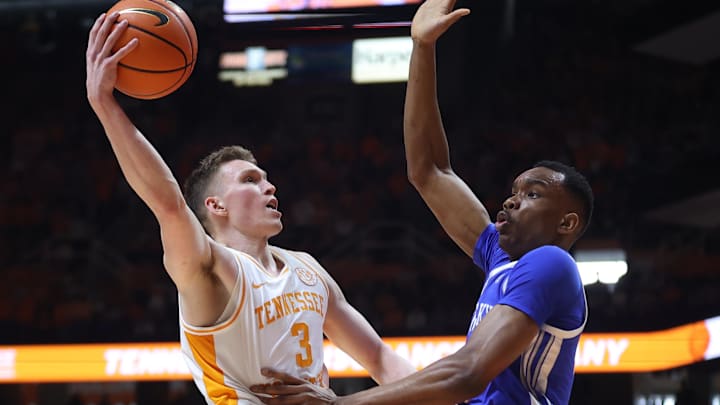Unlike a certain other SEC basketball program, Rick Barnes and Tennessee’s primary objective is to win games in March, not produce NBA lottery picks in June. However, this year, the No. 5 Volunteers have a chance to accomplish both goals behind their electric transfer, Dalton Knecht.
Tennessee heads into the SEC Tournament as the No. 1 seed after taking the outright regular season title for the first time since 2007-08. The Vols though, are coming into the postseason off a loss, 85-81, to that other SEC program, despite a 40-point performance from Knecht.
The Vols will begin play in Nashville on Friday at Noon CT in a quarterfinal matchup with the winner of LSU/Mississippi State. If the tournament goes chalk, Tennessee will get another shot at the No. 2 seed, Kentucky. If that meeting comes to fruition, it will be in the SEC Championship on Sunday, and will not just be another opportunity for Barnes’s team to cement itself as the best in the league and deserving of a No. 1 seed in the NCAA Tournament, but also a chance for Tennessee’s NBA prospects to prove themselves against the likes of Reed Sheppard and Rob Dillingham, two projected lottery picks.
Jordan-James tested the waters and entered his name into the NBA draft process last offseason, but ultimately decided to return for a fifth year in Knoxville. Now 23-year-old, the athletic wing’s production fell off with the addition of Knecht as Tennessee’s primary scoring option, but he’ll still be an intriguing development piece as an undersized forward with passing ability and defensive versatility.
Jordan-James won’t be the type of player who takes over a game on the offensive end, so there won’t be much of an opportunity for him to skyrocket up draft boards in the SEC Tournament, but as Knecht draws the eyes of NBA evaluators, they may take a liking to Jordan-James’s proclivity to do the dirty work for the Vols.
In his final season of a long collegiate career, one that began with NBA aspirations, Jordan-James averaged 8.7 points, 6.4 rebounds, 1.9 assists, 1.3 steals, 0.6 blocks, and shot 32.7% from three. He’s not currently seen as a draftable player by most NBA two-round mock drafts, but could sneak into the back end of Round 2, but if not, will definitely find his way onto a Summer League roster.
Everybody knows that Dalton Knecht, the Northern Colorado transfer can score. He averaged 21.4 points in the regular season while shooting 40.5% from three and 47.4% from the field. He’s an elite catch-and-shoot threat, but can punish teams off the dribble and the best part of the game is his pull-up shooting, especially from mid-range.
In the NBA he’ll likely become more of a three-point specialist, but is lacking half of the highly-coveted three-and-D designation. The question marks about Knecht are all on the defensive end of the floor. Maybe, he wouldn’t look as poor defensively if he wasn’t the obvious weak link on one of the best defensive teams in the country, but because Tennessee is elite all around him, so he is often targeted by opponents.
A dominant scoring run through the month of March and all the way to the Final Four certainly won’t hurt his draft stock, but NBA teams will be viewing Knecht as a role-player, not a primary initiator, and No. 1 scoring option, so evaluators will be more interested in his defensive competency.
Right now, Knecht is mocked as a mid-first-rounder, and having already turned 23-year-old, it’s unlikely he’ll climb much higher, even in a weak draft class.
